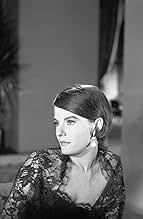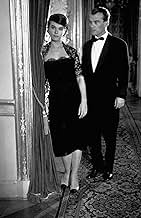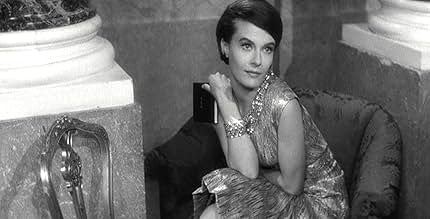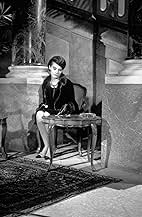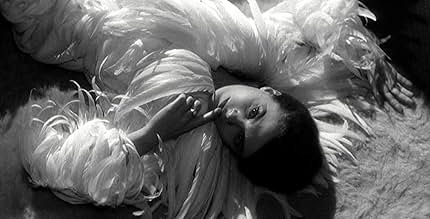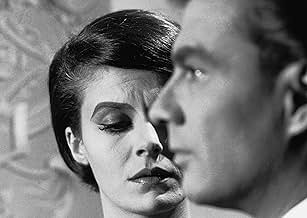AVALIAÇÃO DA IMDb
7,6/10
26 mil
SUA AVALIAÇÃO
Em um estranho e isolado castelo, um homem se familiariza com uma mulher e insiste que eles já se conheceram antes.Em um estranho e isolado castelo, um homem se familiariza com uma mulher e insiste que eles já se conheceram antes.Em um estranho e isolado castelo, um homem se familiariza com uma mulher e insiste que eles já se conheceram antes.
- Direção
- Roteirista
- Artistas
- Indicado a 1 Oscar
- 2 vitórias e 5 indicações no total
Karin Toeche-Mittler
- Un personnage de l'hôtel
- (as Karin Toche-Mittler)
Davide Montemurri
- Un personnage de l'hôtel
- (as Davide Montemuri)
Alan Edwards
- English Introduction
- (não creditado)
Avaliações em destaque
This mysterious film shows us a man and a woman in an extravagant and capacious hotel. The man insists that he had an affair with the lady last year in Marienbad (or was it somewhere else?) The woman denies it, and just wants the man to leave her alone. Perhaps the man did meet her, perhaps he didn't. Resnais puts the pieces there and lets us take what we can from it.
The beautiful looking establishment, complete with gardens of splendour, is an eerie setting for the film. The guests seem like they are in a trance most of the time. A card game is shown where a man cannot be beaten, he claims. The cinematography is brilliant. Dark, then white, giving a blinking effect at times; and constantly switching between different locations. The music throughout the film sounds like it's from an old church organ. I can understand why this film will put off some people, because it doesn't explain much, and does meander at a pedestrian pace. But approached in the right mood, and watched in a dark room, this is a film to appreciate. Peter Greenaway thinks so; the film was influential in the making of The Draughtsman's Contract, and is (supposedly) the film Greenaway most admires.
The beautiful looking establishment, complete with gardens of splendour, is an eerie setting for the film. The guests seem like they are in a trance most of the time. A card game is shown where a man cannot be beaten, he claims. The cinematography is brilliant. Dark, then white, giving a blinking effect at times; and constantly switching between different locations. The music throughout the film sounds like it's from an old church organ. I can understand why this film will put off some people, because it doesn't explain much, and does meander at a pedestrian pace. But approached in the right mood, and watched in a dark room, this is a film to appreciate. Peter Greenaway thinks so; the film was influential in the making of The Draughtsman's Contract, and is (supposedly) the film Greenaway most admires.
The title of Dali's best known work is an apt description of this film. A man meets a woman at a European spa and tries to convince her (and himself) that they met one year ago. While the plot is simple, its presentation is not. I first saw L'annee derniere a Marienbad while taking a French Film class in college. Of the dozen or so films we watched, Marienbad has stayed with me the longest. The nameless protagonist's memories repeat, sometimes minutely changed, sometimes not. The same organ motifs echo again and again, all against the backdrop of elegant hallways and sitting rooms. Through all this, the man attempts to spirit the woman away from her husband/companion, while at the same time establish once and for all what happened last year and what did not. More than any other film, Marienbad has shown me the difference between American film conventions and what else is possible. While so many American releases are rigidly plot driven, Marienbad uses film as a tool for exploration and introspection. Instead of linear story telling, director Resnais allows his characters to explore the details of what may be memory or just imagination. Against a detached, almost stoical background of extras and cool interiors, Delphin Seyrig and Giorgio Albertazzi display a sharp contrast of passion, pleading, and denial. I agree with a previous reviewer that much of the look of Marienbad has been appropriated by commercials for perfume; however, if you haven't seen this film before, you most likely have never seen anything quite so surreal.
It would take a braver person than me to delineate what LAST YEAR AT MARIENBAD is `about', but as it is such an entirely thought provoking film, perhaps some sort of `meaning' can come from sharing these thoughts about it. Many people define it as cerebral and classical, but to me it is romantic and gothic. What is remarkable about the setting and the characters is that they are all so wealthy that they can rise above the concerns of ordinary mortals, only to find that this advantaged life brings other problems - of identity, purpose and values. They are strangely existentialist - the existentialism of great wealth - their small talk is intelligent, informed and stilted; they are all beautiful in the sense that money can partly buy beauty, and yet, in the process, they have lost human warmth, real sexual desire, and any purpose in life other than to drift on in their station in life. But desire is a respecter of nobody, and it is this element of human nature that haunts the corridors of the hotel like an invisible mist, and subconsciously their acutely civilised life-style which has bereaved them of something they no longer acknowledge or recognise and have deeply repressed - only to find it lingers on the fringes, confusing and disturbing them - spoiling everything; a depressive dissatisfaction. There is no joy, no enjoyment. The gardens become symbols of this desire to enslave, conquer and exile nature - formal, rigid and planned, and yet within the hotel, all around are decorative symbols of the chaotic and random aspects of nature. Everything appears to carry a symbol that needs to be interpreted - if it is there, it must have meaning, and if the Man says that they had arranged to elope together when they were at Marienbad, (or was it Marienbad, or elsewhere, and what does it matter?), how can the Woman be sure that this is not a ruse, made up to give immediate warning that we exile our emotions at our peril? That to acknowledge this for one second risks opening floodgates which will overwhelm and destroy? Or, that the ultimate expression of desire is death itself, as the film's closing line hints when the Man's voice speaks, over the night time silhouette of the hotel, of, `You.. and me.. together.. always.. in the night'. And it is an eternal night that we all subconsciously know lays in wait for us. The Great Leveller indeed! A remarkable film by any standards, and one which for me at least, is much darker and more sinister than has generally been recognised. But maybe it is just a springboard from which we can all set off on a journey guided by our own subconscious longings and dreads?
My top 5: Alain Robbe-Grillet's "L'Imortelle" takes number 1 (by a landslide), and its a tie between David Lynch's Eraserhead & Blue Velvet for position 3, closely followed by Louis Buñuel's "Andalusian Dog" and Stan Brackage's "Dog Star Man" (which I would have rated number 1, except that I hated that so much I will not give it the satisfaction of being highly rated in any category!) and finally "Koyanisquatsi" which I defy any to explain or justify!
So - Last Year At Marienbad, in a nutshell, assume French Accent:
Verse 1: Man: I know you. Woman: You do not know me. Man: We were here. Woman: I was never here. Chorus: Man: Long strange monologue about the place that they are at, Marienbad. And how he has been here before and how she has been here before. Camera: panning about the ornate Marienbad mansion. Verse 2: (repeat verse 1 - add very interesting game of pick-up sticks) Chorus repeat verses 1 & 2
I think everyone should see this film. I don't know why. I have seen it numerous times. No, I have never seen it. Yes, I saw it last year! No, last year I did not see it. Yes, I saw it here, with me. Wait, I'm alone. Who am I talking to?
So - Last Year At Marienbad, in a nutshell, assume French Accent:
Verse 1: Man: I know you. Woman: You do not know me. Man: We were here. Woman: I was never here. Chorus: Man: Long strange monologue about the place that they are at, Marienbad. And how he has been here before and how she has been here before. Camera: panning about the ornate Marienbad mansion. Verse 2: (repeat verse 1 - add very interesting game of pick-up sticks) Chorus repeat verses 1 & 2
I think everyone should see this film. I don't know why. I have seen it numerous times. No, I have never seen it. Yes, I saw it last year! No, last year I did not see it. Yes, I saw it here, with me. Wait, I'm alone. Who am I talking to?
"Last Year at Marienbad" (1961) Dir.: Alain Resnais
When it comes to cinema, I'm neither a philistine nor a scholar. I'm happy to read into a film's artistic context in preparation for watching it, but it must be self-evident, and not reliant upon anything but its own merit and communicability to be considered a success. In practice, this means I will certainly read the hype, but I won't necessarily believe it. And it's a good job, because "Last Year at Marienbad" remains one of the most hyped, discussed and debated movies of all time. People disagree over virtually everything about it - the pace, the narrative structure, the individual performances, the pretense, even the plot points. Yes, that's right, after forty-eight years people still argue over what actually happens in this film, let alone what it all means and how successfully it is presented to us. So I decided to ignore the minefields of audience opinion (which is largely positive anyway, if wildly diverse) and dive in without fuss, volunteering to watch this movie from the 'philistine' end of the spectrum and if I didn't like it, screw it. It's only one film anyway.
When it became clear what I was watching, and how many traditional storytelling criteria were obviously not going to be fulfilled by "...Marienbad", I felt like I had burst in to the film's aristocratic country retreat wearing torn jeans and waving a bottle of tequila around, but ended up having an awesome time in a completely unexpected way. Make no mistake, I thoroughly enjoyed this movie. It is a near-perfect realisation of a very, very dense and ambitious concept, and Resnais should be proud that he and his film-making team were able to make it. It is stately, baffling, elegant, sinister and brilliant.
Not that I could tell you what it's actually about, of course. Most people seem to think it's about the tricks and subjective nature of the memory, and the inherent flaws in how we cross-reference events with other events over time. These broad, elemental themes are the only ones I feel sure enough about to include in this review, which is illustrative of "Last Year at Marienbad"s disorienting effect. We are taken on an endless stroll through the rooms and corridors of a cold, strange country manor where the upper classes take their holidays and engage in card games and theatre. Their discussions are empty and meaningless, yet they go on forever. Time is not present in a recognisable form as the unnamed narrator loses track of how long he has been there, and how long he has attempted to persuade the unnamed woman that they met before, and that she had promised to run away with him. "Wait for one year," she'd supposedly said. "Next year I will leave with you." But the woman has no memory of him or her promise. She appears to be married to another man, who is tall, dour and imposing. Despite this, she keeps the unnamed narrator at arm's length, drawing him in and then pushing him back as if she does indeed remember something of him but is unwilling to accept it. His struggle to awaken some kind of acknowledgement of their shared past is the premise of the film.
"Last Year at Marienbad" is a bizarre maze of half-recollections and inaccuracies, where words and events are repeated several times in different situations and everything we see is very possibly on an endless loop, eventually folding in on itself and collapsing into a kind of incomprehensible singularity. We have no frames of reference for what we are seeing other than what has already been seen, and we are never to know what's 'now' and what's a memory because the characters cross over between the two. As a result I found myself trying to draw a line between reality and false memory up to about half way through the film, after which I abandoned it as a futile exercise. This is one of its key strengths - it demands so much of the viewer that we are forced to build a structure for it in our own heads, and our efforts are routinely dashed.
This all sounds terribly oblique and ridiculous, and in a sense it is; its detractors have regularly labelled it as such and that's a valid conclusion to reach. But it is spectacular on the eye, and this carried my attention right through the difficulties and to the end of the movie without so much as a pause. The camera sweeps down hallways and bursts out across garden terraces without even a jolt, it literally dances its way through the film as if it were another character. There are odd touches, too, that contribute to the striking atmosphere of the film, like Resnais' decision to have his supporting actors and extras remain completely static until they are speaking or in the company of the main three characters. He also skillfully breaks the pace by accelerating towards several shuddering climaxes in the last half of the film, which renew the viewer's attention and string us further along towards an ending that we hope will allow us something more definite to grasp.
Whether it does or not, I will withhold. It's one of the many reasons to watch this film. But beware, it is genuinely challenging viewing – and in fact, its esotericism is the only reason I won't rate this higher than I have.
When it comes to cinema, I'm neither a philistine nor a scholar. I'm happy to read into a film's artistic context in preparation for watching it, but it must be self-evident, and not reliant upon anything but its own merit and communicability to be considered a success. In practice, this means I will certainly read the hype, but I won't necessarily believe it. And it's a good job, because "Last Year at Marienbad" remains one of the most hyped, discussed and debated movies of all time. People disagree over virtually everything about it - the pace, the narrative structure, the individual performances, the pretense, even the plot points. Yes, that's right, after forty-eight years people still argue over what actually happens in this film, let alone what it all means and how successfully it is presented to us. So I decided to ignore the minefields of audience opinion (which is largely positive anyway, if wildly diverse) and dive in without fuss, volunteering to watch this movie from the 'philistine' end of the spectrum and if I didn't like it, screw it. It's only one film anyway.
When it became clear what I was watching, and how many traditional storytelling criteria were obviously not going to be fulfilled by "...Marienbad", I felt like I had burst in to the film's aristocratic country retreat wearing torn jeans and waving a bottle of tequila around, but ended up having an awesome time in a completely unexpected way. Make no mistake, I thoroughly enjoyed this movie. It is a near-perfect realisation of a very, very dense and ambitious concept, and Resnais should be proud that he and his film-making team were able to make it. It is stately, baffling, elegant, sinister and brilliant.
Not that I could tell you what it's actually about, of course. Most people seem to think it's about the tricks and subjective nature of the memory, and the inherent flaws in how we cross-reference events with other events over time. These broad, elemental themes are the only ones I feel sure enough about to include in this review, which is illustrative of "Last Year at Marienbad"s disorienting effect. We are taken on an endless stroll through the rooms and corridors of a cold, strange country manor where the upper classes take their holidays and engage in card games and theatre. Their discussions are empty and meaningless, yet they go on forever. Time is not present in a recognisable form as the unnamed narrator loses track of how long he has been there, and how long he has attempted to persuade the unnamed woman that they met before, and that she had promised to run away with him. "Wait for one year," she'd supposedly said. "Next year I will leave with you." But the woman has no memory of him or her promise. She appears to be married to another man, who is tall, dour and imposing. Despite this, she keeps the unnamed narrator at arm's length, drawing him in and then pushing him back as if she does indeed remember something of him but is unwilling to accept it. His struggle to awaken some kind of acknowledgement of their shared past is the premise of the film.
"Last Year at Marienbad" is a bizarre maze of half-recollections and inaccuracies, where words and events are repeated several times in different situations and everything we see is very possibly on an endless loop, eventually folding in on itself and collapsing into a kind of incomprehensible singularity. We have no frames of reference for what we are seeing other than what has already been seen, and we are never to know what's 'now' and what's a memory because the characters cross over between the two. As a result I found myself trying to draw a line between reality and false memory up to about half way through the film, after which I abandoned it as a futile exercise. This is one of its key strengths - it demands so much of the viewer that we are forced to build a structure for it in our own heads, and our efforts are routinely dashed.
This all sounds terribly oblique and ridiculous, and in a sense it is; its detractors have regularly labelled it as such and that's a valid conclusion to reach. But it is spectacular on the eye, and this carried my attention right through the difficulties and to the end of the movie without so much as a pause. The camera sweeps down hallways and bursts out across garden terraces without even a jolt, it literally dances its way through the film as if it were another character. There are odd touches, too, that contribute to the striking atmosphere of the film, like Resnais' decision to have his supporting actors and extras remain completely static until they are speaking or in the company of the main three characters. He also skillfully breaks the pace by accelerating towards several shuddering climaxes in the last half of the film, which renew the viewer's attention and string us further along towards an ending that we hope will allow us something more definite to grasp.
Whether it does or not, I will withhold. It's one of the many reasons to watch this film. But beware, it is genuinely challenging viewing – and in fact, its esotericism is the only reason I won't rate this higher than I have.
Você sabia?
- CuriosidadesThe match game in the movie is named as "Nim". In order to win the game there is only one tactic including a system called "Nim Sum". If both players use this tactic perfectly, then the owner of the first move will eventually lose. Due to the same reason, it is always disadvantageous to start the game first.
- Erros de gravaçãoExterior night scenes were shot day-for-night, but the sky and reflections of it were allowed in the frame, and they appear as bright white instead of black. This may have been intentional to emphasize the surreality of the film.
- Citações
[X wanders through the hotel's corridors cataloging items he sees]
X: Empty salons. Corridors. Salons. Doors. Doors. Salons. Empty chairs, deep armchairs, thick carpets. Heavy hangings. Stairs, steps. Steps, one after the other. Glass objects, objects still intact, empty glasses. A glass that falls, three, two, one, zero. Glass partition, letters.
- ConexõesFeatured in Fejezetek a film történetéböl: A francia új hullám (1990)
Principais escolhas
Faça login para avaliar e ver a lista de recomendações personalizadas
- How long is Last Year at Marienbad?Fornecido pela Alexa
Detalhes
- Data de lançamento
- Países de origem
- Central de atendimento oficial
- Idioma
- Também conhecido como
- Last Year at Marienbad
- Locações de filme
- Empresas de produção
- Consulte mais créditos da empresa na IMDbPro
Bilheteria
- Faturamento bruto nos EUA e Canadá
- US$ 207.917
- Fim de semana de estreia nos EUA e Canadá
- US$ 15.485
- 20 de jan. de 2008
- Faturamento bruto mundial
- US$ 223.111
- Tempo de duração
- 1 h 34 min(94 min)
- Cor
- Mixagem de som
- Proporção
- 2.35 : 1
Contribua para esta página
Sugerir uma alteração ou adicionar conteúdo ausente



